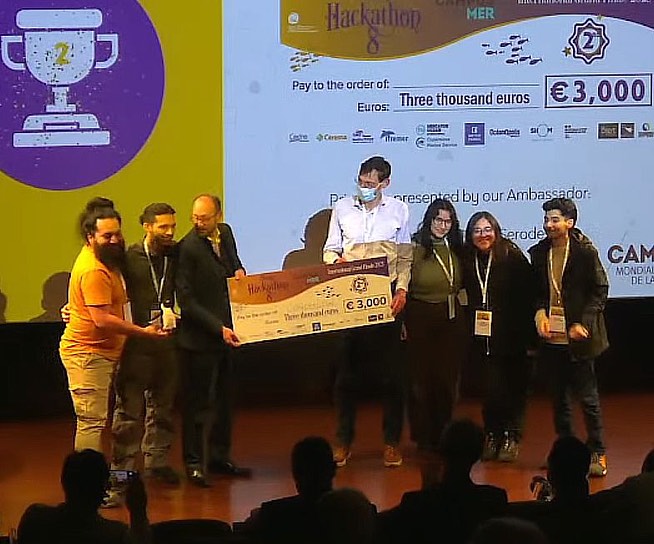"License to Krill": the project that seeks to manage ecosystems with machine learning that shone at the Ocean Hackaton® 2023
December 2023. - A machine learning model that allows predicting the volume of krill in the Antarctic area and thus avoid its targeted exploitation: this is the project of the interdisciplinary team of students composed of Cristian Cofré, Master in Computer Science; Dantes Arduam, Bachelor of Science with a major in Physics; Danilo Astorga, Marine Biology and Yanara Morgunovsky; Danilo Astorga, of Marine Biology and Yanara Morgunovsky of Marine Biology, all from the Universidad Austral de Chile (UACh), together with Octavio Mercado, oceanographer of the Laboratory of Coupled and Biophysical Processes of the UACh and Matilde Rivas, Master in Sciences with mention in Computation of the U. de Chile and student of the Millennium Institute Foundational Research on Data.
The project won second place worldwide in Ocean Hackaton® 2023, the international competition of French origin that brings together actors of the scientific-technological ecosystem, in order to develop digital solutions related to the oceans and the maritime community through prototypes designed in 48 hours.
"We wanted to predict krill because it is a fundamental species in the Antarctic ecosystem; many other species feed on it. It also sequesters carbon, that is, it "absorbs" CO2 from the atmosphere, so it is vital to prevent further global warming. We are interested in discovering where krill live in their different life stages in order to suggest new conservation areas, based on science, since the Antarctic Peninsula is an area where there is a lot of krill fishing. We realized that using machine learning we can project the abundance of krill in the Antarctic Peninsula for different scenarios of global warming, which will be useful to take adaptation measures", explains Matilde Rivas, the IMFD student who is part of the "License to Krill" project team.
The prototype uses a biogeophysical model of artificial intelligence to manage the ecosystems of the biological resource in the South Shetland Islands, located about 120 km from the Antarctic Peninsula. In the competition, the national team had to perfect their prototype and pitch to convince an international jury in six minutes of presentation and five minutes to answer queries, which you can see in this video. With this achievement, they were able to finance the project with 3 thousand euros.
The data processed through machine learning can be visualized on an interactive map and the information they are collecting benefits three entities: the scientific community in terms of opening up knowledge; the industry, as it allows them to improve krill catch and diversify fishing zones; and decision makers, as it allows them to generate new areas for the protection of the marine ecosystem, according to what Dantes Arduan explained to BioBioChile.
The event brought together more than 600 participants and more than 200 coaches divided into 79 teams from different countries, with the aim of summoning talents from different areas of knowledge that can devise solutions to current problems facing the oceans. The other winning teams of the competition, which has been held since 2019, were the representatives of France and Malaysia. At the national level, the competition took place in different instances throughout 2023 and was organized by the French Embassy in Chile, the French Institute of Chile and the French Institute for Research in Science and Digital Technologies (Inria).
"We are super happy, super proud of this achievement. We have been working on this for several months and in general we are very pleased with the results. It was a difficult competition, not only the local stage in Concepción, but also here at the world championship, but we managed to win and leave Chile in a good place," commented Dantes Arduam.

The international final of the event - which distributed 9,500 euros in prizes for the development of the initiatives - was opened by Michel Gourtay, President of Technopôle Brest-Iroise and presented by Rob Gwinner, English Apart.

Krill is a small crustacean, similar to shrimp, which plays a fundamental role in the food chain of marine ecosystems. In fact, it is food for predators such as penguins, seals, sea lions, whales and fish.
But beyond the food chain, this tiny creature is key to mitigating climate change, as it captures and removes carbon from the Antarctic Ocean.
Despite this, its existence is threatened due to global warming and industrial fishing. Although its capture is regulated, the lack of data on krill abundance and its projections limit the understanding of this activity in the Antarctic Peninsula.
